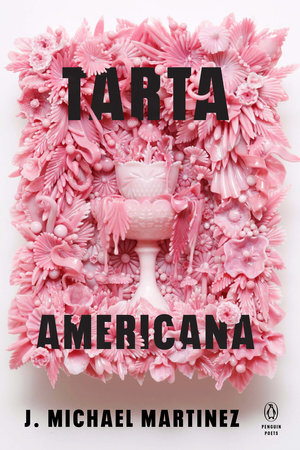The sequence of poems making up “The Angello Fabrications” came very late in the process of writing my latest collection of poetry, Tarta Americana. At San Jose State University, I had just taught Aaron Angello’s Fact of Memory in my graduate MFA poetry workshop; in the work, Angello writes creative nonfiction meditations on each word of Shakespeare’s Sonnet 29; the one-page meditations wax philosophical, act as memoir entries, or become sites of poetic reflection. In response to the work’s gorgeous meanderings, I wanted to understand its syntactic logic of worlding, and, so, I mirrored Angello’s process: in my work, I chose to meditate, word by word, on the chorus of Ritchie Valens’ “We Belong Together.” The prose poem sequence that emerged became a structuring force for the book as a whole; the sequence’s prose ruminations on temporality, the body, and love, spread out across the book, acted as scaffolds to Tarta Americana’s overarching themes.
“Eternity” is the last prose poem in the sequence. As I edited the sequence, sculpting, the work of the language spoke to me of a corporeal space-time, of a shared intimacy, of relationship, and generation. In the extended sequence, the corporal body became an event reaching through history to make the genetic past a visibly embodied present. In the poem, one’s body is observed as the event of both the particular (my body in its particularity and as an index of its broader historical instant) and the general (my genetic forebears in their particularity and as an index of their broader historical context). In “Eternity,” the body takes on an allegorical structure. The spatiotemporal experience of the body and its revelation of the body as a metaphorical sequence through time mirrors, as Craig Owens notes, classical rhetoric’s conception of allegory: “This projection of structure as sequence recalls the fact that, in rhetoric, allegory is traditionally defined as a single metaphor introduced in a continuous series.” The allegory that is the body is made allegorical not just because of its inherent (and inherited) qualities, but also because of the context in which it is perceived by others. The observer is always positioned in the world; their allegorical visioning and its consequent archetype is rendered from within such an angle.
In my “Eternity,” poetry attempts to overcome itself as language to arrive at language, using metaphor (as the prerequisite of that visual allegorical rendering of the body) not as trope, but as epistemology and ethics, a fleshy ethics and epistemology never abstracted from the corporeal.
Aaron Angello’s prose inspired me, showing me how eternities can be found in the plaintive cry of a 1950’s pop ballad. Percy Bysshe Shelley writes, “The great secret of morals is love; or a going out of our nature, and an identification of ourselves with the beautiful which exists in thought, action, or person, not our own.” For Shelley, metaphor pierces the veil of time and difference, exceeding the binary and the logic of non-contradiction. In relation to self-consciousness, awareness is born of a self-reflective act through perceiving what is similar in the dissimilar. In contrast to the irrational rationality of linear time, the time of love is composed of a past and present interpenetrating and inter-relational.
As the calendar turns over its count into a “new” year, 2024, and as the allegories of our bodies evolve, I think it is important to remember, as bodies in and of space-time, we are sites, not of an individual or any particular unchangeable identity, but as creatures of flesh ever individuating from and individualizing with the broader ecologies and economies of our social worlds, interpenetrating and inter-relational. Selfless.




